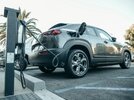- Joined
- 3 July 2009
- Posts
- 28,263
- Reactions
- 25,567
The rationalisation of EV manufacturers continues.
The American electric car brand Canoo has filed for Chapter 7 bankruptcy, leaving the company unable to meet its financial obligations.
Management owes several creditors amounts ranging between $10 million and $50 million each, while the company itself is left with just $50,000 in cash.
Despite its financial struggles, CEO Tony Aquila has faced criticism for receiving an exceptionally high salary and benefiting from private jets.
The company developed a versatile "lifestyle car" capable of functioning as a minibus, pickup truck, and transporter.
But the ambitious plans never materialized into commercial success. Canoo managed to produce only a small number of vehicles.
By 2023, the company generated just $6.5 million in revenue — one-third of which came from the sale of three vehicles to the state of Oklahoma. Hopes for financial backing from the U.S. Department of Energy’s loan program were dashed when the application was denied, leaving the company unable to secure additional funding.
The American electric car brand Canoo has filed for Chapter 7 bankruptcy, leaving the company unable to meet its financial obligations.
Management owes several creditors amounts ranging between $10 million and $50 million each, while the company itself is left with just $50,000 in cash.
Despite its financial struggles, CEO Tony Aquila has faced criticism for receiving an exceptionally high salary and benefiting from private jets.
The company developed a versatile "lifestyle car" capable of functioning as a minibus, pickup truck, and transporter.
But the ambitious plans never materialized into commercial success. Canoo managed to produce only a small number of vehicles.
By 2023, the company generated just $6.5 million in revenue — one-third of which came from the sale of three vehicles to the state of Oklahoma. Hopes for financial backing from the U.S. Department of Energy’s loan program were dashed when the application was denied, leaving the company unable to secure additional funding.







